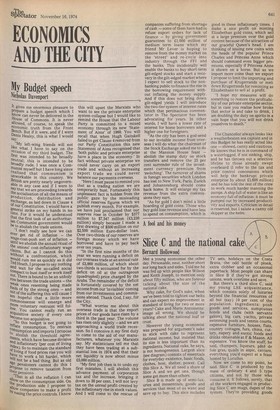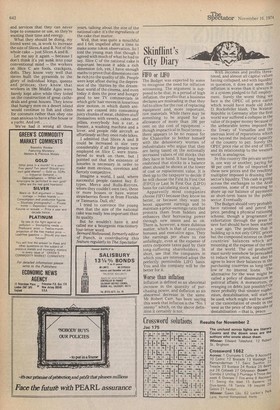A fool and his money
Slice C and the national cak
Bernard Hollowood
Met a young economist the other day. Personable, neat, neither short nor long back and sides. Told me he was fed up with people like Wilson and Keith Joseph, to mention only about fifty million, who are forever talking about the size of the national cake.
Why cake, for God's sake, when we've been told to tighten our belts and can expect no improvement in standard of living for two or more years? Cake and Marie Antoinette: image all wrong. We should be talking about the national loaf or crust. However the young economist was prepared for argument's sake to stick with cake to represent national income, but insisted that its size is less important than its ingredients. National cake, he says, is not homogeneous. Largest slice (see diagram) consists of essentials for everyday existence, basic foods, clothes, heat, shelter, power. Call this Slice A. We all need a share of Slice A and we get one, though some get more than others. Slice B is made up of semi-luxuries and inessentials, goods and services that most of us want and save up to buy. This slice includes TV sets, holidays on the Costa Brava, the odd bottle of plonk, extra clobber and an occasional paperback. Most people can share in Slice B if they've got strong unions, work overtime and save.
But there's a third slice C, said my young LSE acquaintance, which consists solely of luxuries beyond the financial resources of all but (say) 10 per cent of the population. Ingredients: posh goods and services, sumptuous hotels and clubs (with servants galore), big cars, yachts, private swimming pools and tennis courts, expensive furniture, houses, flats, country cottages, furs, china, cutlery, napery and exotic foods and drinks obtainable at F & Mason. All expensive. You know the stuff, he said, champers, liqueurs, pat de foie gras, quails in aspic, caviare, everything you'd expect at a feast hosted by Lucullus.
Now we come to my point, he said. Slice C is produced by the mass of ordinary 4 and 5 type citizens, and not by those who consume it. It follows, surely, that all the workers engaged in producing Slice C are mugs, dupes of the system. They're providing goods
and services that they can never hope to consume or use, so they're wasting their time and energy.
What they should be doing, my friend went on, is work to increase the size of Slices A and B. Not of the whole cake —just Slices A and B.
Let me say it again — because I don't think it's yet sunk into your conventional mind — the workers on Slice C are fools, crackpots, dolts. They know very well that slaves built the pyramids to the glory of individual kings, queens and princes; they know that workers in tile Middle Ages were barely kept alive while they toiled on the construction of great cathedrals and great houses. They know that hungry men on a desert island would continue to fish and climb for coconuts rather than obey one man anxious to have a fine house or a yacht. And yet. . . .
We've had it wrong all these
years, talking about the size of the national cake: it's the ingredients of the cake that matter.
Well, that was quite a mouthful and I felt impelled after a time to make some token observation. So I told the young man that though I agreed with much of what he had to say, Slice C of the national cake is important because it adds a rich dimension (oh, yes, I have enough maths to prove that dimensions can be rich) to the quality of life. People were kept afloat during the depression of the 'thirties by the dreamboat world of the cinema, and even today it does the poor and hungry good to see TV commercials in which girls' hair moves in luxurious slow motion, in which dumb animals are coaxed into consuming juicy chunks of meat, children stuff themselves with sweets, cakes and jellies, everybody has a car, a freezer, a washing machine and a lover, and people ride aircraft as effortlessly as they once rode bikes.
I admitted that Slices A and B could be increased in size very considerably if all the people now employed on Slice C were transferred to work on them, but I pointed out that the existence of luxuries is necessary in order to make men envious, covetous and fiercely competitive.
Imagine a world, I said, where successful people cannot buy Etypes, Mercs and Rolls-Royces, where they couldn't own two, three Or more houses or have winter strawberries flown in from Florida or Tasmania. Dull, eh?
I tried to convince the young man that the size of the national cake was really less important than its quality.
But he wouldn't have it and called me a bourgeois reactionary four-letter word.
Bernard Hollowood, formerly editor of Punch, is contributing this feature regularly to The Spectator



































 Previous page
Previous page